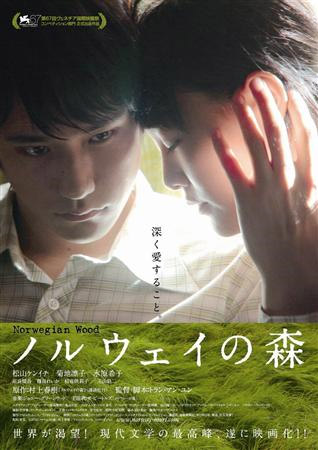
It’s easy to have bad ideas. One such idea was “Let’s make Norwegian Wood into a movie!”
Norwegian Wood, Haruki Murakami’s breakout novel, has in my uninformed opinion influenced Japanese cinema culture in the 24 years since it was first published. The nostalgic student romance genre has been essentially perfected as an art by a long series of directors – some distinctive, some interchangeable, but many worthwhile.
The same can’t be said of Anh Hung Tran, who has taken only the bad lessons and excesses of so much student melodrama and fashioned them into a movie that is not only superficial, but deeply unsatisfying. I don’t see how anyone who has read the book could be pleased with this result but, more than that, it is a failure of the cinematic form. Dull and soporific when it isn't being irritating and shrill, there's nothing here to recommend.
Watanabe narrates the time he spent at college and describes his relationships with the women he wooed there: childhood friend and psychologically unstable Naoko and the eternally optimistic Midori.
What one can say of Norwegian Wood as a novel is that it communicated a strong sense of interiority on the part of both Watanabe as the narrator and every character that he meets. He is an empty container waiting to be filled with the wisdom and life stories of others. We don't care what he learns in his classes, but we care what he learns from the people around him. Here, sadly, there is nothing for him to absorb. Every conversation that he engages in is depressingly one note: with no depth to these characters, they go around in endless circles talking about nothing of interest. Much of the dialogue is taken verbatim from the novel, but with most of the important and interesting parts pruned out. Watanabe is a hollow shell wandering from scene to scene to have women tell him how they feel – without really saying anything at all of note.
No one has motivation beyond their mere existence. What are any of these people doing at university? Who the Hell cares! They’re young, and young people of opposing genders are destined to love each other through the simple act of proximity. This is why, when two women come into your orbit, you must immediately dispose of one of them. How convenient, then, that one of them should have to go away. How unfortunate that none of them have any character to speak of.
So with no dialogue of import or interest, there's no real momentum to this film. Characters walk together in silence for what seems like minutes. It's not a contemplative silence, either, but just a hole in the film. We're supposed to be entranced by what we're watching, we're supposed to be getting a feeling from the atmosphere, but it's terribly samey. Worse is when Tran tries to force our emotional hand with the awful score, provided by Radiohead's Jonny Greenwood. Crashing and discordant strings are telling us that we must be grieving or we must be sad, but there is no chance of this. There is no chance of connecting to situations so one dimensional – and what few attempts that Tran makes at conflict don't strictly exist in the book and are so grating and out of character that they feel like they belong in a film even worse than the one we got saddled with.
Everything is supposed to dreadfully serious, but the key moments of the film's climactic scenes are so laughably handled that it is impossible to grasp what Tran was aiming for: he presents the final act at first as if it were a Japanese horror film, and then sets his dial to extreme melodrama – all without dialogue, of course, and all to the ghoulish ministrations of Greenwood. What little dialogue there is throughout the film completely fails to gel with the actual vision we've been given: Tran has condensed the time frame depicted on screen without actually altering the script to go with it; Watanabe and Naoko progress from summer to a perpetual winter, presumably because that's more gloomy for directorial purposes, but somehow a couple of years have passed.
For such a beloved property, Norwegian Wood is an oddity. Was Tran hoping that the audience would give him a pass on his poorly sketched work because of familiarity with the source material? Doing a total disservice to every character that he parades onto the screen would suggest that he simply shouldn't have bothered. I think that it wouldn't have been that difficult to make the novel into a film without stripping it of its capacity for tenderness and poignancy. The film is actually impressive simply for the spectacular scale of its failure. Even had I not read the book last week, I am certain that there is nothing that I could have taken away from it.
Norwegian Wood offers no sense of place, time or character: three things absolutely essential to making a worthy adaptation of the book, not to mention a film worth watching. We're left with petty melodrama that is less than boilerplate in its production; this movie is aggressively lazy. Name recognition can only carry you so far, and I simply resent the fact that this of all films is, I think, the first Japanese film to get a general release in Australia since 2009's far superior Departures and Ponyo. Our country, and world cinema, deserves better.
